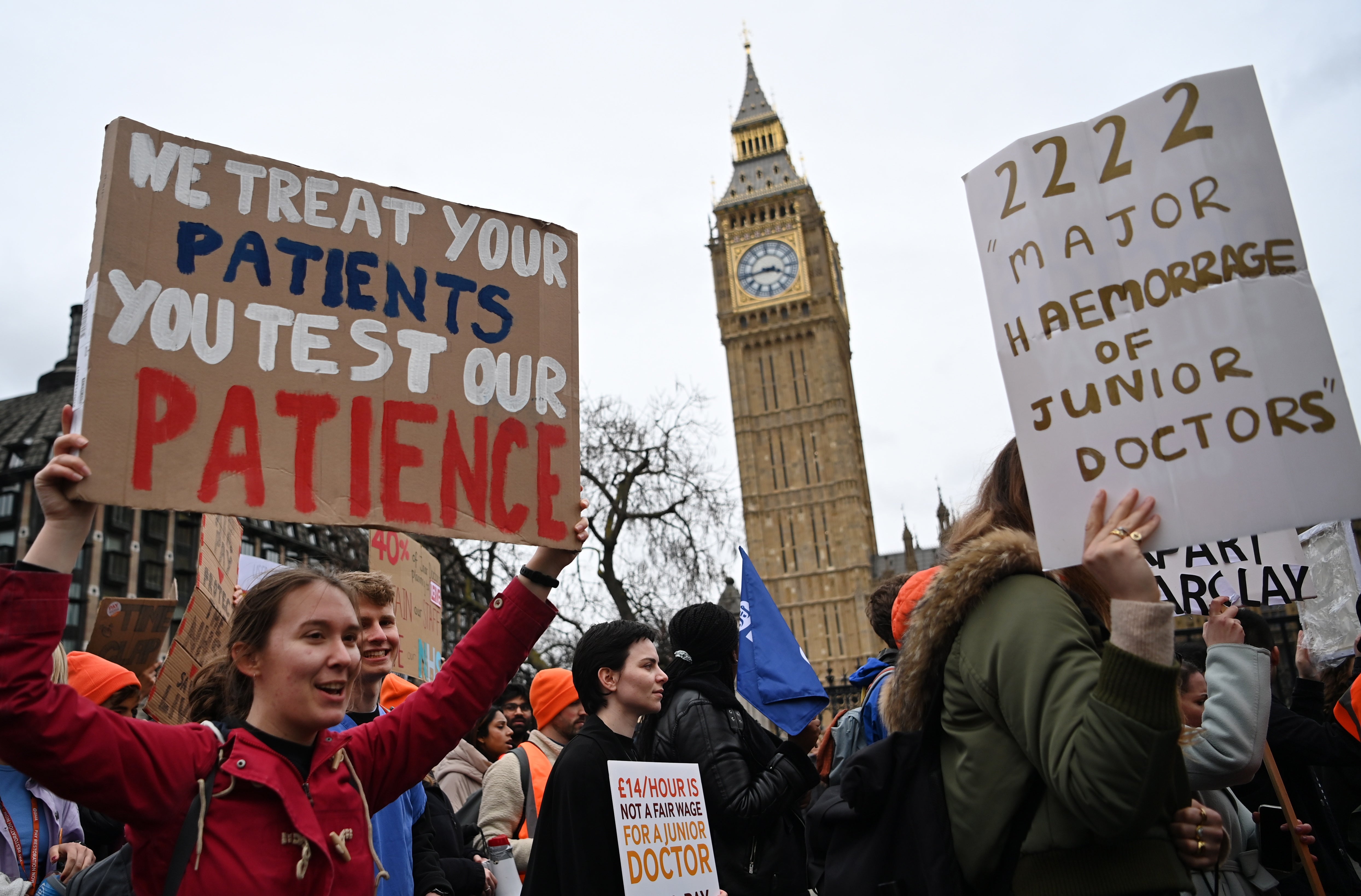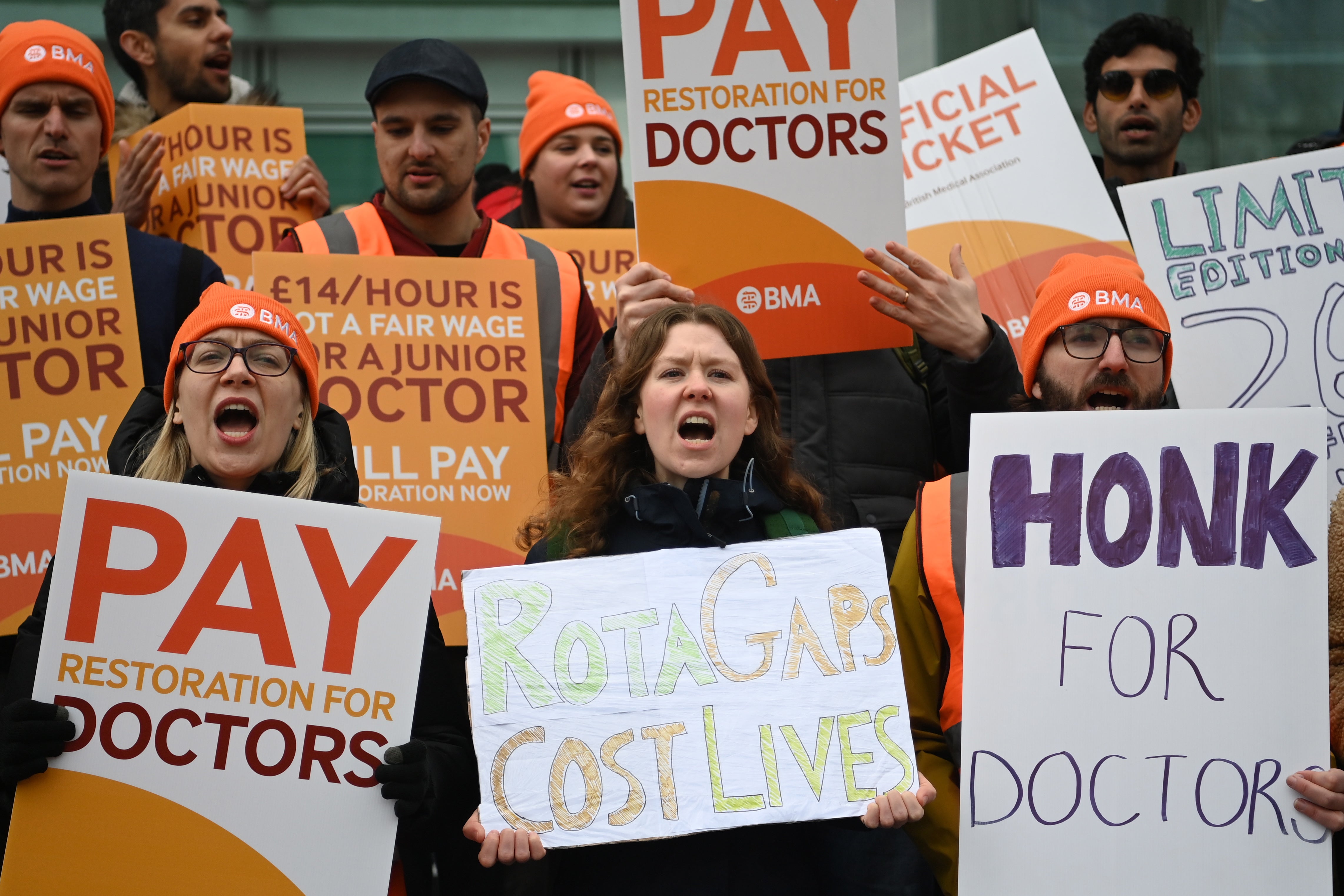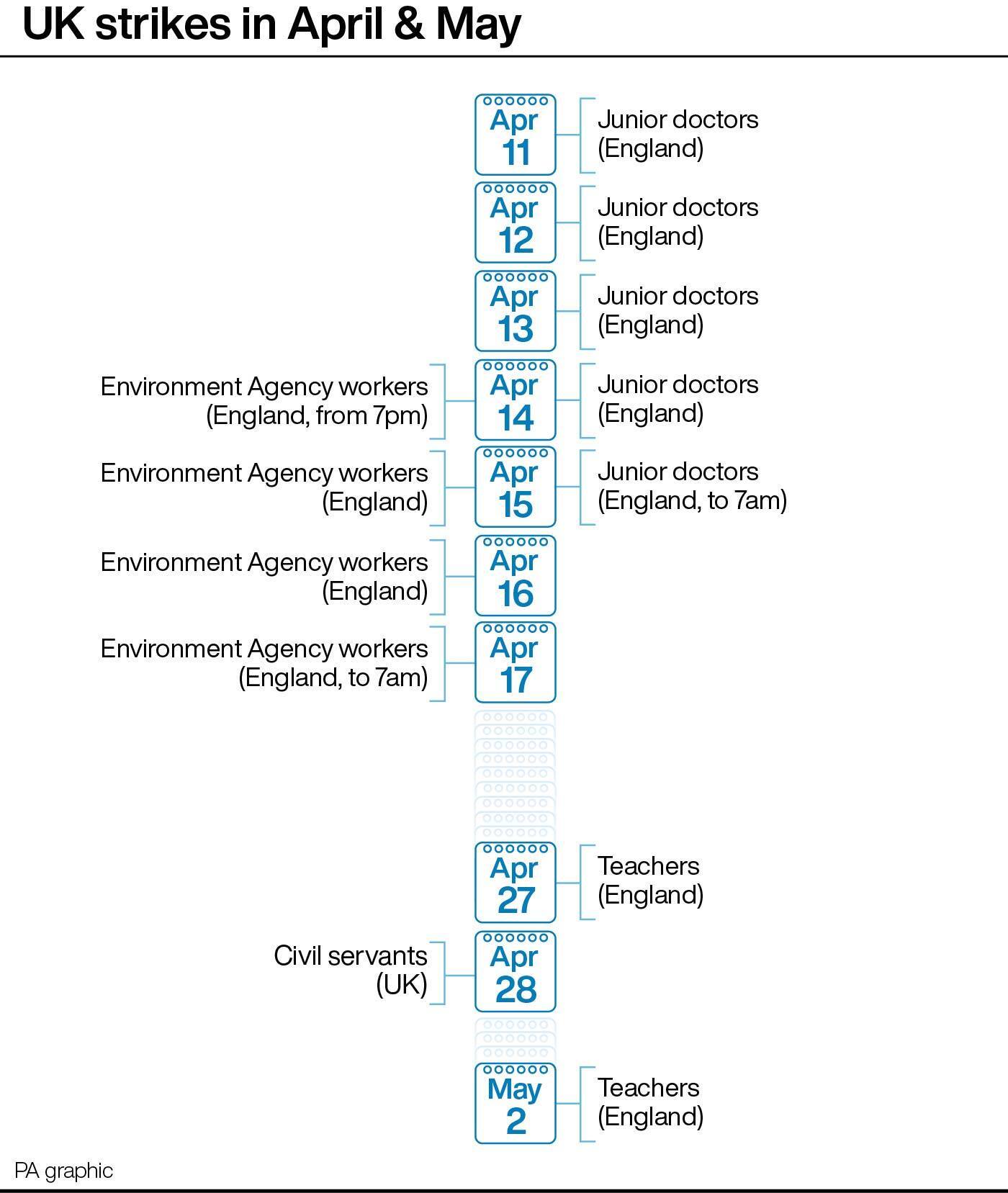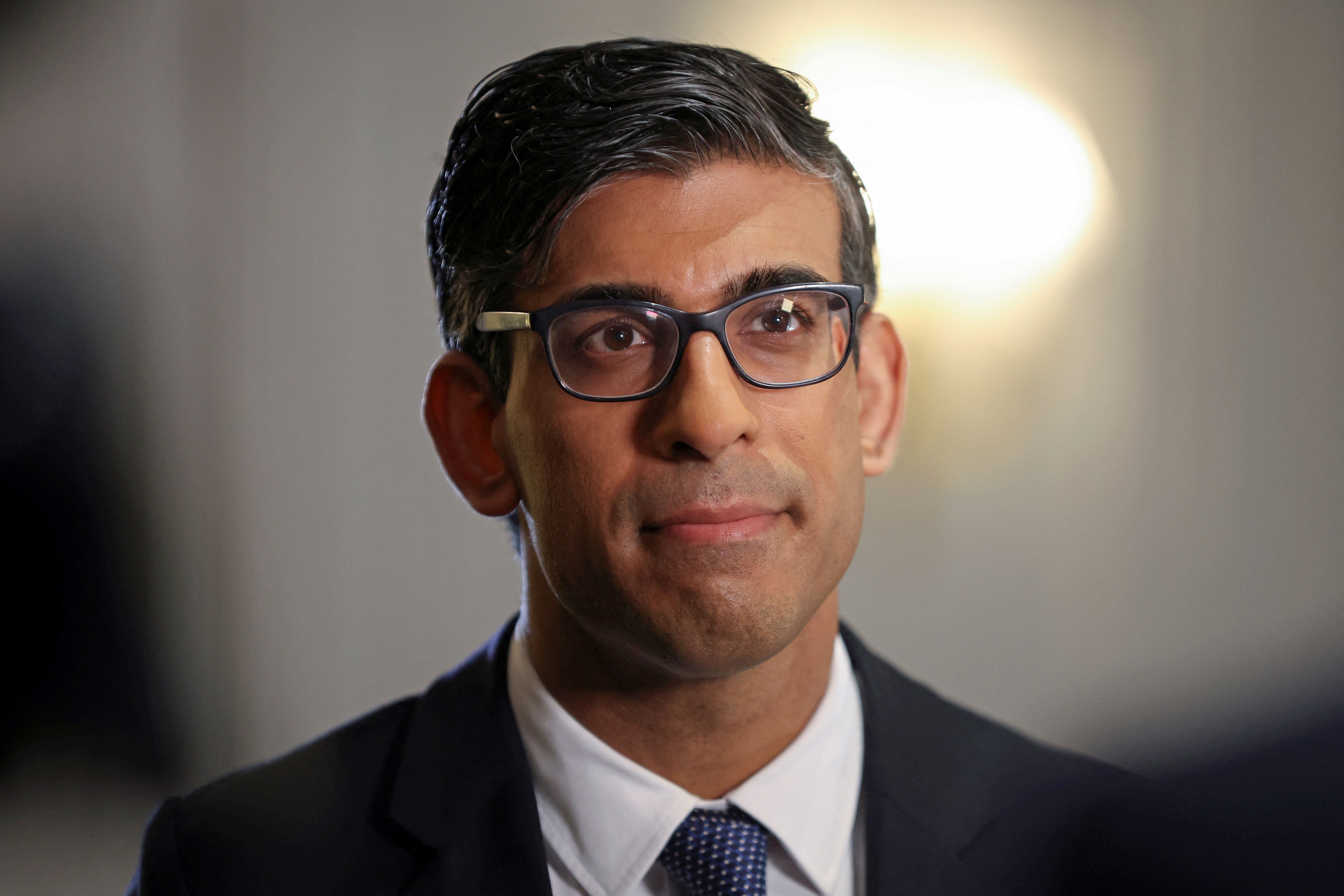
Rishi Sunak has urged junior doctors to call off their strike and withdraw an “unreasonable” 35 per cent pay demand as a former health minister said their demand for a wage hike was “bonkers”.
Downing Street insisted there would be no talks with the British Medical Association until the group abandoned their starting position, saying the request was “completely out of step” with other pay settlements in the public sector.
It came as former Tory health minister Lord Bethell told The Independent that junior doctors are behaving like the Socialist Workers Party and that the demand is “not a reasonable place for grown-ups to begin a conversation”.
In other developments:
- Hospital bosses raised fears that A&E could be unsafe at night during the walkouts without adequate cover
- The BMA agreed to ask junior doctors to return to work in one hospital after a request by NHS officials
- The health secretary said his “door remains open” and that he wants to engage in talks with junior doctors
A walkout by junior doctors began at 7am on Tuesday and will continue until Saturday morning, with experts claiming it will be “the most disruptive” industrial action in NHS history.
It has been estimated that some 350,000 appointments and operations have been rescheduled as a result of the action as senior doctors and other medics who are not on strike have been diverted to cover services such as A&E and maternity care.

Mr Sunak’s spokesman said: “We call on the BMA and junior doctors to cease their strikes and revise their starting point for negotiations, which is 35 per cent, which we continue to believe is unreasonable. It is not affordable to the British taxpayer.”
They added: “We cannot negotiate from the starting point. We’re ready to sit down, if they remove that 35 per cent starting point and cease industrial action.”
Lord Bethell told The Independent: “I have a lot of respect for healthcare professionals, and this is not the way a serious organisation like the BMA should be deporting itself.
“I do not know how anyone could sit at a table with people who are demanding a 35 per cent pay rise. That is not a reasonable place for grown-ups to begin a conversation.
“They are behaving like the RMT [union]. If this was a bunch of Marxist train drivers I would take it in my stride but junior doctors who are making a fortune and have a massive pension behaving like the Socialist Workers Party is just appalling.”
Urging the union to put forward proposals, he added: “The idea that a 35 per cent pay rise for junior doctors is going to suddenly improve the health system is bonkers and wrong.”

Unions and the government were urged to negotiate as NHS bosses warned that there is a heightened risk to patient safety during the walkouts.
NHS Providers, which represents health service trusts, highlighted the difficulty hospital bosses are facing in trying to ensure nightshift medical rotas are fully staffed this week.
“Getting through today is just the start. Trust leaders are worried about securing adequate cover for the night shifts ahead. This is going to be a very long, difficult week for the NHS,” said Miriam Deakin, the head of policy at NHS Providers.
“Keeping patients as safe as possible, trusts’ number one priority, will be even harder than in previous strikes so it’s all hands on deck.”
Meanwhile, the BMA agreed to allow junior doctors to provide emergency cover for Western General Hospital’s A&E.
Under NHS contingency plans, hospital leaders can request for doctors to return to work for a limited time in certain circumstances “to maintain safe patient care”.
The BMA said: “Protecting patient safety during strikes has always been a priority to the BMA. However, poor planning by local management has left the Emergency Department and acute medicine at Weston General Hospital exposed.
“As a result, the BMA has agreed that a total of seven junior doctors can be asked to volunteer to return to work today and tomorrow.”

This will be the first time the BMA has agreed to such a move, with a blanket ban during the three-day strike in March.
The strikes centre around a pay row between the BMA and government, with the union claiming junior doctors in England have seen a 26 per cent real-terms pay cut since 2008-09 because pay rises have been below inflation.
The union has asked for a full pay restoration that the government said would amount to a 35 per cent pay rise.
Health secretary Steve Barclay said the timing was “regrettable” and had been designed to “maximise disruption”.
“My door is open and we remain willing to engage constructively with the junior doctors but clearly a demand of 35 per cent – which would involve some junior doctors receiving over £20,000 more in terms of their basic pay – is not reasonable,” he said.
“We want to reach a fair and reasonable settlement with junior doctors – we recognise the hugely important role that they play within the NHS.
“That’s why we stand ready to have meaningful and constructive talks with them, as we have had with other health unions, as we have in terms of responding ... to concerns from doctors regarding their pension.”

Professor Sir Stephen Powis, national medical director for the NHS in England, told Times Radio there would be disruption, cancellations and rescheduling.
Asked about comments that the strike will cause disruption for at least a month, he said: “It will certainly last weeks.
“We’ve asked hospitals to reschedule appointments as quickly as possible but this is going to cause unparalleled disruption, so it will take some time.”
Dr Vivek Trivedi, co-chairman of the BMA’s junior doctors committee, said doctors wanted the government to come to the table in an “honest and meaningful way”.
“Strikes are by nature designed to be disruptive, to put pressure on the government to come to the table to ultimately work towards an end to this dispute,” he said.
“Where we go forward is, of course, reserving the right for further industrial action if the government doesn’t negotiate with us, but that’s all we want them to do.
“We just want them to come to the table in an honest and meaningful way. But of course if they don’t, then we would reserve the right for further industrial action.”
He added: “The government has not even tried to meet us anywhere in the middle, it hasn’t given us a counter-offer at all.
“We’ve extended our olive branch many times and Mr Barclay is continuing to kick the can down the road, which is why we need to see some goodwill from him.”







